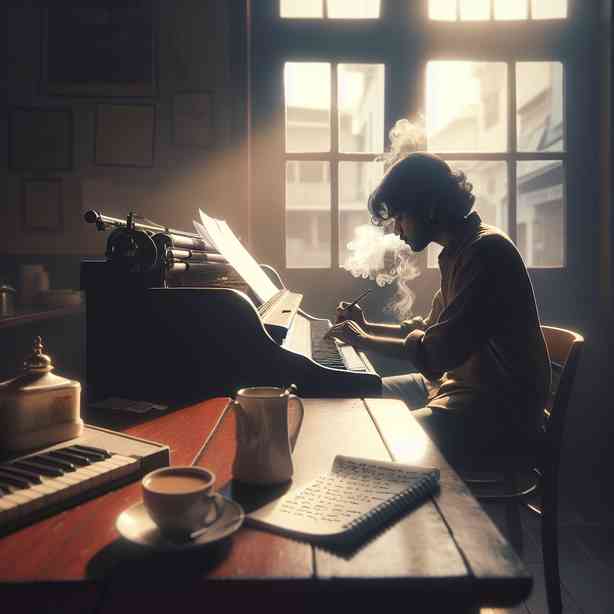
Creating a song without realizing it can be an intriguing experience, one that many songwriters encounter at some point in their creative journeys. While this phenomenon may seem spontaneous, it often stems from a deep-seated emotional connection to our surroundings, our experiences, and our inner thoughts. To understand this process better, let’s explore the intricacies of songwriting, the subconscious inspirations behind music creation, and how to recognize when you’ve unwittingly crafted a song.
Songwriting is an art form that requires not only talent but also a willingness to explore one’s emotions and thoughts. Often, individuals find themselves humming a melody or jotting down lyrics without fully comprehending that they are in the midst of crafting a song. This unconscious process can serve as a therapeutic outlet, providing relief from stress and an opportunity to articulate feelings that may be difficult to express verbally.
The subconscious often plays a vital role in songwriting. Many artists describe moments when lyrics or melodies seem to emerge from nowhere, guided by an unseen creative force. This phenomenon can be attributed to various factors—personal experiences, current events, or even fleeting moments of inspiration that resonate deeply. When we allow ourselves to tap into our emotional reservoirs, we can create melodies that resonate not only with ourselves but also with others who share similar feelings or experiences.
Recognizing when you’re in the midst of songwriting, even subconsciously, is essential. The act can happen when you least expect it—perhaps while you’re doodling in a notebook during a meeting, standing in line at a coffee shop, or even while taking a shower. These moments of inspiration often come about when your mind is at ease, allowing thoughts to flow unrestricted. Thus, maintaining a creative mindset becomes crucial. Keeping a journal of snippets of lyrics, melodies, or even general ideas can serve as a reservoir of inspiration for future songs.
The nature of songwriting also reflects one’s personal growth and self-discovery. Each song we write can be viewed as a snapshot of where we are at that moment in life. It captures feelings, ideas, and experiences. As we evolve personally, so will our songwriting. We may find ourselves experimenting with different genres, exploring new themes, or collaborating with other artists, allowing diverse influences to shape our work. This natural progression is part of the beauty of the songwriting journey.
Additionally, understanding the technical aspects of music can also enhance one’s songwriting ability. Learning about chord progressions, song structures, and lyrical techniques provides a foundation upon which to build. However, it’s vital to remember that while having structure is beneficial, creativity often thrives within freedom. The most memorable songs sometimes break conventional norms, leading to fresh and innovative sounds that capture listeners’ attention.
Emotional authenticity is crucial in songwriting. When we write from our heart, we connect on a deeper level with our audience. Songs that convey genuine emotions often resonate the most, as listeners find solace in knowing that someone else understands their experiences. This shared understanding strengthens the bond between the artist and their audience, often leading to lasting connections forged through music.
Technology also plays a significant role in the modern songwriting landscape. With the rise of digital audio workstations and online collaboration tools, artists are now able to produce high-quality music without needing an extensive studio setup. Social media platforms allow songwriters to share their creations with a global audience, receiving instant feedback that can refine their craft. This accessibility encourages more individuals to pursue their passions, often leading to unexpected discoveries within their songwriting processes.
In crafting a song without consciously realizing it, the act itself becomes a journey—a journey defined by creativity, exploration, and emotional expression. The process allows individuals to delve into their subconscious, producing a piece of art that reflects their inner world. Recognizing and embracing these moments can enhance one’s relationship with music and foster a deeper appreciation for the songwriting craft.
Lastly, to cultivate this spontaneous creative energy, it is important to remain open to experiences and observant of the world around us. Keeping the mind attuned to the ebb and flow of emotions can lead to inspired moments that might transform into beautiful songs. Embrace the unexpected; sometimes, the best compositions come when we are least expecting them.
In conclusion, that time you wrote a song without realizing it can serve as a pivotal moment in your creative journey. It symbolizes the connection between your inner self and your artistry, illustrating how deeply intertwined our emotions can be with the creative process. By reflecting on these experiences, you can enhance your ability to create, recognize the beauty in spontaneity, and perhaps inspire others along the way. Whether you wear the hat of a seasoned songwriter or a curious beginner, embracing this journey with an open heart and mind will only lead to more profound artistic expressions and delightful musical explorations.


